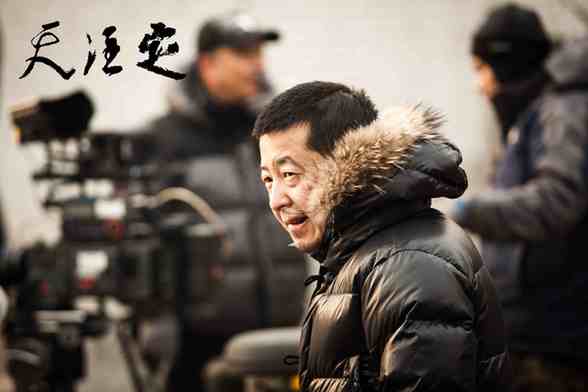A touch of sin
- By Giovanni Vimercati
 0 Comment(s)
0 Comment(s) Print
Print E-mail China.org.cn, June 28, 2013
E-mail China.org.cn, June 28, 2013
A blown-up fresco of a modern China run over by turbo-capitalism, "A Touch of Sin" is a minimalist epic of maximum proportions. As often is the case in his films, director Jia Zhangke, a master of contemporary cinema, observes the periphery of humanity to describe its epochal changes. The China in Jia's film resembles neither the promotion of its "peaceful rise" nor the vilification the West likes to project onto its "enemies." Here, the camera is not trying to judge or cover up, it is trying to show what it feels like when progress hits you in the face. The Chinese economic miracle is traversed by contradiction and corruption, which come with the territory of moneymaking - be it China or any other country.
|
|
|
"A Touch of Sin" is a minimalist epic of maximum proportions. [File photo]? |
Time and again, capitalism means wealth for some and dispossession for others; you just rarely see its ugly side at the movies. While Hollywood has historically focused on the winners and less on the losers, Jia has always placed his camera behind ordinary characters so as to show the world from their perspective. His films are nonetheless devoid of blunt political claims; the director of "Platform" and "The World" is more interested in detailing the effects that progress and social evolution have on human relations. A subtle humanist who does not provoke, Jia does even less to cater to Western double standards. Unsurprisingly, Jia does not enjoy the same fame that other Chinese dissidents enjoy in the "free world."
His latest film, which won the Palme D'or at Cannes this year for Best Screenplay, narrates the daily injustices that industrial revolutions tend to entail. "A Touch of Sin" recounts from within the viral outbreaks of economic growth; we happen to be in China, but the ruthless death knell of capital accumulation sounds the same wherever it resonates. It is shiny and arousing on the surface, nasty and rotten on the inside; it is indeed a matter of perspective. In "A Touch of Sin," working class angels roam the nation from north to south on a quest for extermination. From Shanxi, to Chongqing, Hubei and Guangdong, vindicating inequality with guns and knives is their mission, one driven by money and desperation.
The episodic structure of the film gives the narrative a gospel-like quality that perfectly suits the biblical, if apocryphal, tone of its tales. An exasperated peasant, after having tried to denounce the petty corruption of his village chief, goes on a vengeful killing spree taking out servile functionaries and evil bosses alike. Rather than a premeditated act, the peasant's desperate gesture is the ultimate scream of a voiceless "contrarian," a madman who still believes in social justice. Not everyone shares his "na?ve" attitude; there is for instance another character that roams the Chinese peripheries on a motorbike killing people, a sort of neo-capitalist bounty killer making a living by taking to the letter the precepts of predatory merit. In the third episode, a woman who works as a receptionist in a spa, tired of warding off the sexual advances of wealthy clients convinced that money can buy them everything, decides to kill one of them by slicing his throat.
The last episode is perhaps the most effective and sardonic vignette of the film. Set in a high-end brothel, it follows the precarious existence of migrant workers and prostitutes. Here, like in Jia's work "The World," the contrast between the tacky opulence of the establishment where the young prostitutes work and their fragile sentiments constitutes the poetic backbone of the story. Without indulging in self-righteous morality, the director passes on what perhaps remains the harshest critique the film has on offer: Young prostitutes dressed in Red Army uniforms marching in front of amused, rich customers. The history of China's heritage literally prostituted in the name of profit.
Once again, there is no provocation going on; the director captures with concerned eyes the trivialization that comes with wealth. It is the perverse and violent nature of social disparity rather than a condemnation of the Chinese state that Jia is interested in. If anything, the film is filled with genuine concern about the blackmail of progress and the sneaky toll it takes. It is a film that prefers to focus on what economic miracles take away, rather than on what they bring. It is a vital point of view at a time when moneymaking seems to be humanity's ultimate goal and purpose. Even in a country such as China with a millenarian culture.
After watching Jia's latest film, one cannot help but wonder why in the democratic Western world, where the level of inequality and social injustice has nothing to envy from China, films of such urgent social critique are seldom being made. Maybe because the empty catchphrase that democracy has turned into remains the favourite opium for a shrinking middle class too busy exorcising the ghost of poverty to look into its origins and consequences. Western cinema too could do with a touch of sin.
The author is a columnist with China.org.cn. For more information please visit:
http://m.91dzs.com/opinion/giovannivimercati.htm
Opinion articles reflect the views of their authors, not necessarily those of China.org.cn.






